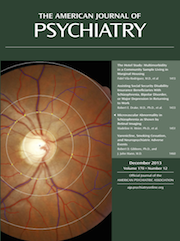Varenicline, Smoking Cessation, and Neuropsychiatric Adverse Events
Abstract
Objective
In 2009, the U.S. Food and Drug Administration issued a black box warning for varenicline regarding neuropsychiatric events. The authors used data from randomized controlled trials and from a large Department of Defense (DOD) observational study to assess the efficacy and safety of varenicline.
Method
The authors reanalyzed data from the 17 placebo-controlled randomized controlled trials (N=8,027) of varenicline conducted by Pfizer, using complete intent-to-treat person-level longitudinal data to assess smoking abstinence and reports of suicidal thoughts and behavior, depression, aggression/agitation, and nausea and to compare effects in patients with (N=1,004) and without (N=7,023) psychiatric disorders. The authors also analyzed a large DOD data set to compare acute (30-day and 60-day) rates of neuropsychiatric adverse events in patients receiving varenicline or nicotine replacement therapy (N=35,800) and to assess reports of anxiety, mood, and psychotic symptoms and disorders, other mental disorders, and suicide attempt.
Results
In the randomized controlled trials, varenicline increased the risk of nausea (odds ratio=3.69, 95% CI=3.03–4.48) but not rates of suicidal events, depression, or aggression/agitation. It significantly increased the abstinence rate, by 124% compared with placebo and 22% compared with bupropion. Having a current or past psychiatric illness increased the risk of neuropsychiatric events equally in treated and placebo patients. In the DOD study, after propensity score matching, the overall rate of neuropsychiatric disorders was significantly lower for varenicline than for nicotine replacement therapy (2.28% compared with 3.16%).
Conclusions
This analysis revealed no evidence that varenicline is associated with adverse neuropsychiatric events. The evidence supports the superior efficacy of varenicline relative to both placebo and bupropion, indicating considerable benefit without evidence of risk of serious neuropsychiatric adverse events, in individuals with and without a recent history of a psychiatric disorder.



